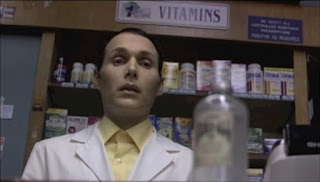Frankenstein (James Whale, 1931, US)
It is hard to overstate the influence of James Whale's 1931 film Frankenstein. Along with Tod Browning's Dracula, the film introduced the world to the possibilities of the horror film. Aside from the German Expressionists, Whale was one of the first directors to bring a high art sensibility to horror. His landscape of fog and cobwebs would become the definitive standard by which all later horror films would be judged. While Frankenstein is perhaps not as good as its follow-up - 1935's The Bride of Frankenstein - it still stands as one of the best films in the Universal canon.
Colin Clive as Dr. Frankenstein gives one of the most iconic performances in movie history, with a wild unhinged performance that reaches its apotheosis in the now-famous line - "It's alive!" Karloff as the Monster is of course incredible. Interestingly, in the Mary Shelley novel, Frankenstein's monster is an intellectual figure, having long conversations about the nature of humanity. Here Karloff portrays humanity differently, making us feel sympathetic to the monster through the film. His ultimate demise is one of the most powerful moments in the film, and truly disturbing in retrospect.
There are several still disturbing moments in the film, which no doubt raised the suspicion of censors at the time. Many people often point to Frankenstein's monster's unintentional murder of the little girl in the lake, and her father carrying her dead body through the town, as examples of this. The Universal monster films at this time were still serious and did not have much of the humor that would appear in later iterations of the franchise. This lends them a gravitas that still appears in the films even 90 years later. James Whale proved himself one of the greatest directors of all time with this film and would go on to direct many amazing films.
9/10




Comments
Post a Comment